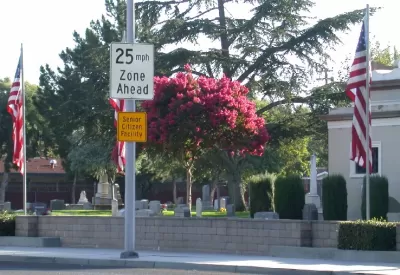A call to action to change the paradigm of planning and development to better serve an aging nation.

Allison Arieff takes a detailed and compassionate look at the housing implications of the country's aging population.
The article begins with a personal anecdote—if this issue isn't personal to you yet, as it is for Arieff, than it will be soon enough. The population aged 65 and over is expected to grow to 79 million from 48 million in the next 20 years. Most communities in the country are not prepared to accommodate the demographic explosion.
Arieff first cites a new report from the Joint Center for Housing Studies at Harvard [pdf], "Projects and Implications for a Growing Population: Older Households 2015-2035 Housing," which "reveals that this demographic shift will increase the need for affordable, safe housing that is well connected to services way beyond what current supply can meet." Supplementing those demographic realities are the facts about where the country is growing, as presented by findings of a new study from the Urban Land Institute's Terwilliger Center for Housing. That study "shows that suburban areas surrounding the 50 largest metropolitan areas in the United States make up 79 percent of the population of those areas but accounted for 91 percent of population growth over the past 15 years (and three-quarters of people age 25 to 34 in these metro areas live in suburbs)."
Thus, Arieff illustrates how decades of development and settlement patterns have left so much of the country's aging population in communities that don't serve their needs.
But suburban homes were originally designed, and for the most part still are, for young families — and for drivers. They are typically surrounded by other single-family houses. Lacking a fitter partner or a network of helpful neighbors and caring family members, older residents can end up feeling isolated, unable to do basic errands or keep up their property.
Then, a call to action: "We’ve got to change this paradigm." More specifically, Arieff argues that urban environments, with their proximity, transit, and density, shouldn't be the only option for seniors, and she has suggestions for how suburban communities can also build a better quality of life for seniors.
FULL STORY: A Housing Crisis for Seniors

Maui's Vacation Rental Debate Turns Ugly
Verbal attacks, misinformation campaigns and fistfights plague a high-stakes debate to convert thousands of vacation rentals into long-term housing.

Planetizen Federal Action Tracker
A weekly monitor of how Trump’s orders and actions are impacting planners and planning in America.

San Francisco Suspends Traffic Calming Amidst Record Deaths
Citing “a challenging fiscal landscape,” the city will cease the program on the heels of 42 traffic deaths, including 24 pedestrians.

Defunct Pittsburgh Power Plant to Become Residential Tower
A decommissioned steam heat plant will be redeveloped into almost 100 affordable housing units.

Trump Prompts Restructuring of Transportation Research Board in “Unprecedented Overreach”
The TRB has eliminated more than half of its committees including those focused on climate, equity, and cities.

Amtrak Rolls Out New Orleans to Alabama “Mardi Gras” Train
The new service will operate morning and evening departures between Mobile and New Orleans.
Urban Design for Planners 1: Software Tools
This six-course series explores essential urban design concepts using open source software and equips planners with the tools they need to participate fully in the urban design process.
Planning for Universal Design
Learn the tools for implementing Universal Design in planning regulations.
Heyer Gruel & Associates PA
JM Goldson LLC
Custer County Colorado
City of Camden Redevelopment Agency
City of Astoria
Transportation Research & Education Center (TREC) at Portland State University
Jefferson Parish Government
Camden Redevelopment Agency
City of Claremont




























